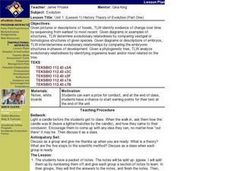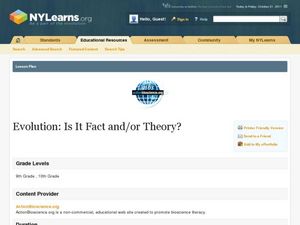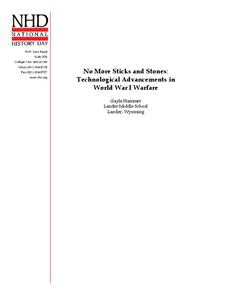Curated OER
History Theory of Evolution
Students identify fossils. They identify evidence of change over time when given pictures of fossils to determine the proper sequencing. In addition, they determine evolutionary relationships by comparing embryonic structures.
Curated OER
Evolution: Is It Fact and/or Theory?
Students explore the concepts of evolution. In this biology lesson, students read articles from the internet. They discuss the article within the group and answer their handouts.
Curated OER
Our Universe: Designed or Evolved?
Students brainstorm and write arguments for Evolution and Intelligent Design. They research the history of each of these ideas. They also examine the controversy of teaching one or both ideas in schools.
Curated OER
The Molecular Evidence for Evolution
Students examine molecular evidence, discover the structure of DNA and gain understanding of genetics. In this molecular lesson plan students compare anatomical evidence with molecular evidence.
Curated OER
EVOLUTION OF BIOTECHNOLOGY
Students create a project using a provided "Evolution of Biotechnology Timeline". Students may pick from many different ideas in order to find a project that interests them. They examine how the use of biotechnology has increased with...
Curated OER
The Origins of Man
Students learn about new technologies being used to update what is known about human evolution and migration. They then compare the new theories to the traditional knowledge.
Curated OER
WHAT, IF ANYTHING, IS A ZEBRA?
Students read the essay, "What, If Anything, Is a Zebra?" following a teacher made reading guide. They investigate cladistics, shared derived characteristics, with further online research to enhance their study of evolution and...
Curated OER
Change Through Time
In this evolution worksheet, learners will complete a table by writing in the era and biological event based on 4 different time periods of Earth's history. Students will answer 8 fill in the blank questions based on the different origin...
Curated OER
The "Science" of Racism
How can we keep racism out of our society? Analyze the factors that lead to racism today and research previous scientific findings that impacted social policy. Your high school students identify ways to prevent past mistakes from...
Curated OER
Invertebrates and Vertebrate Evolution
Learners explore the major characteristics of the major animal phyla. They describe adaptive features that have contributed to the success of animals on land. Students explain how primate evolution provides a context for understanding...
Curated OER
Discovering Dinosaurs
Students discuss that scientists have theories about what dinosaurs were like but are unsure because they are no longer living. In this dinosaur research instructional activity, students examine how scientists use evidence to determine...
Curated OER
Molecular Evidence for Evolutionary Relationships
Students compare the amino acid sequences in cytochrome-c for a variety of organisms and use this information to infer evolutionary relationships. Students investigate the role of homeobox genes and what this indicates about the...
Curated OER
What about Continental Drift?
Fifth graders research the Continental Drift by researching for evidence of continental movement. The teaching explains the theory of plate tectonics and the Earth's magnetic field. They conclude the lesson by watching the video of "In...
Curated OER
The Earliest Primates
In this early primate worksheet, students will read information about the fossil evidence of the earliest primates. Students will complete 3 short answer questions based on their reading.
Cold Spring Harbor Laboratory
Living Things Share Common Genes
Everything evolved from a common ancestor, but how did modern plants and animals develop so many more genes? Scholars use an online interactive to learn about the process. They begin to understand common genes with an animation, multiple...
Curated OER
How Did Humans Evolve?
Students complete an online activity in which they examine fossils to find possible hominid family trees.
Curated OER
A Mendel Seminar
High schoolers analyze Gregor Mendel's discovery of a process of biological evolution. They also explore how recessive and dominant traits are passed from one generation of living organisms to the next. This lesson involves environment...
Curated OER
The Real Eve
Students research about human migration during a specific time period. In this physical science lesson, students watch a video about human evolution. They prepare a presentation on human migration and share it with the class.
Curated OER
Exploring Arthurian Legend
High schoolers investigate the evolution of the King Arthur stories and analyze them as a window into the culture that preserved them. They trace the legends through their earliest versions through medieval and Victorian times and into...
National History Day
No More Sticks and Stones: Technological Advancements in World War I Warfare
Remind young historians that many technological advancements influenced the events of World War I. After analyzing technology's evolution through primary sources, discussing the changes over time, and watching various video clips,...
Howard Hughes Medical Institute
Geological History of Oxygen
Earth didn't always have oxygen, so what caused the change that allows humans to live here? Learn about the change in O2 levels throughout geological history through an interactive graph. Each section offers greater detail on the changes...
Curated OER
What Killed the Dinosaurs?
High schoolers demonstrate how scientists use evidence to formulate hypotheses. They write an essay describing the Cretaceous and Paleocene time periods from the point of view of someone living in that time. In addition, they formulate...
Curated OER
A Tree Full of Ancestors
Students study human evolution and the scientific process. They complete the Origins of Humankind Web activity to become familiar with the hominid species as well as the associated evidence found, in the form of fossils and artifacts.
Curated OER
Becoming Whales: Experiencing Discoveries of
Students experience, through a "dig," the historical discovery of fossils which increasingly link whales to earlier land-dwelling mammals. They encounter the intermediate forms which show changes that lead to the modern whale.
Other popular searches
- Evidence of Evolution
- Evidence for Evolution
- Dna Evidence for Evolution
- Evidences of Human Evolution
- Fossil Evidence of Evolution
- Evidence for Evolution Whale
- Fossil Evidence Evolution
- Evidence Evolution

























